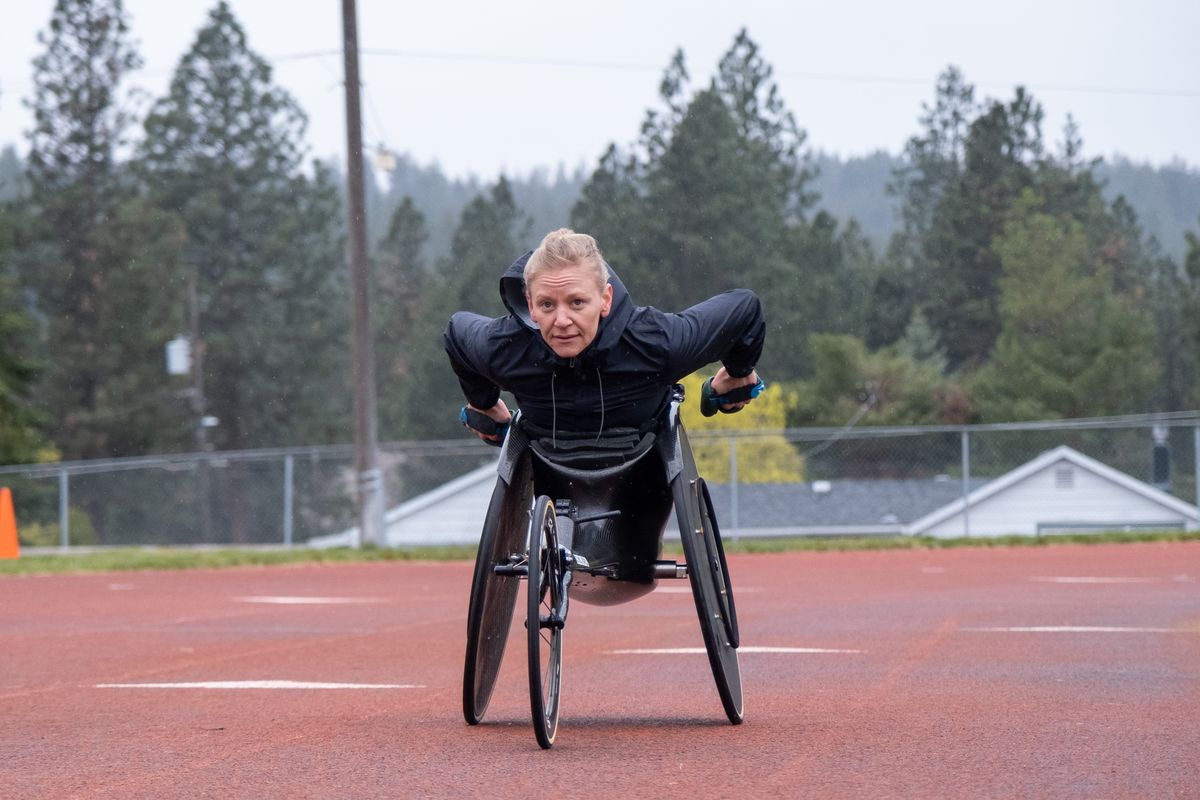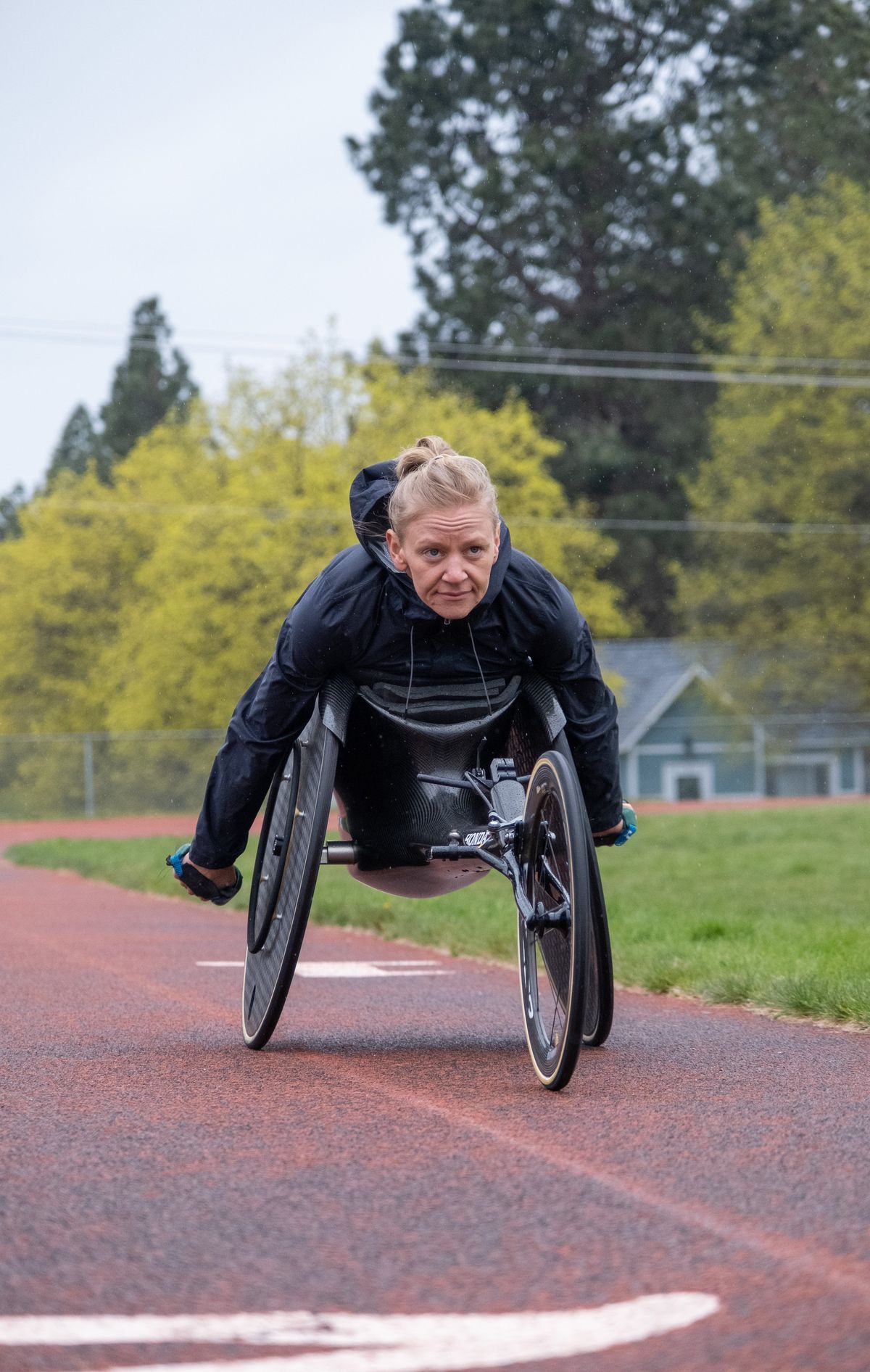‘I can’t even imagine why I’m still alive’: Tekoa’s Susannah Scaroni looks to defend Bloomsday title less than a year after being hit by a car

The sun had barely crested the eastern Illinois horizon when Susannah Scaroni hit the road for an early morning training session ahead of last fall’s grueling marathon slate.
While pushing her racing wheelchair down a long straight near her home in Urbana on Sept. 16, the 30-year-old native of Tekoa, Washington, felt a sudden jolt as her chair rapidly sped up.
She had been hit from behind by a car going nearly 50 mph.
“The next thing I remembered was laying on the ground a few feet away from my racing chair and there was a car stopped with a man walking toward me, so I put two and two together,” Scaroni said. “I was just terrified.”
The result of the accident was a burst fracture of Scaroni’s T8 vertebrae, which kept her in a hospital bed for four days and then in a back brace for four more months.
What made the moment more difficult for Scaroni was remembering where she was just two weeks earlier.
Crossing the finish line as a gold medalist in the Tokyo Paralympic Games.
A golden experience
Competing in the Paralympics was nothing new to Scaroni, who had also represented the United States in London (2012) and Rio de Janeiro (2016). But the 2020 Tokyo games, which took place late last year due to the coronavirus, was a completely different experience.
“Not having spectators due to COVID is something I had kind of gotten used to, but it was really noticeable during the medal ceremonies and that was so different than other games,” Scaroni said. “And the biggest letdown was not being able to have my family there.
“What I felt was really different though was due to the pandemic we hadn’t really raced against other athletes from around the world for two years, which is highly unusual. When you get to the games, everyone goes into a different mindset, but you usually have a better idea where you stand against the rest of the field.”
Known as a stronger marathon racer, Scaroni had worked to improve her track-racing times ahead of Tokyo, which led to her earning spots in the 5,000-, 1,500- and 800-meter events alongside the marathon.
It didn’t take long for her to see the hard work pay off.
In her first event of the games, the 5,000, Scaroni took her turn at the front of the pack in the fifth lap of the 12½-lap race. After a strong pull lap, she slowed to let the next racer lead the pack, but to her shock the nearest competitor was about 100 meters back.
“The first three laps, I stayed in the pack so I could tell the pace, and then I noticed that Manuela Schar from Switzerland pulled really hard on her lead lap, so I thought it was my license to pull hard on my lap,” she said. “Then I moved into the second lane to let the next person take the pace and no one was there.
“Honestly, I had no idea there was no one there, so immediately I was embarrassed because it looked like I was trying to pull away. So I just decided I would go conservatively so I would have some gas in the tank when they eventually caught me, but then a few laps later I looked around and wondered where everyone was.”
Scaroni cruised to the gold – her first Paralympic medal, while nearly missing out on a world record with her time of 10 minutes, 52.57 seconds. Among the few spectators allowed in the stadium was ParaSport Spokane executive director and Scaroni’s childhood coach, Teresa Skinner.
“I don’t think I stopped screaming the entire race,” Skinner said. “Even though Susannah is very competitive, motivated and focused, I think sometimes she is also so gracious that she doesn’t always go for it because she has so much respect for her competitors.
“She loves the moment and experience of the races, so sometimes she doesn’t always take the lead both literally and figuratively. So to see that happen on the biggest stage was remarkable.”
Scaroni went on to add a bronze medal in the 800 and a sixth-place finish in the marathon. Upon returning home, Scaroni’s plan was to focus on completing an internship for her master’s program at the University of Illinois while mixing in some racing.
“I felt like I was the strongest racer in Tokyo, which never in a thousand years would I think would be me,” Scaroni said. “I was actually more motivated to keep racing after the games. I had personal records in all my events and to do that at this point in my career, I was so focused on racing and getting better.”
Those plans changed in the blink of an eye.

From fun to fire
Skinner estimates she’s coached more than 50 wheelchair track and field athletes between running ParaSport Spokane – founded in 2013 – and the adaptive sports program at St. Luke’s Rehabilitation Center before that. But even in that crowd of faces, her earliest memories of Scaroni still stand out.
“I will never forget the first time that she realized how fun competitiveness was,” Skinner said. “She was about 12 and before that it was all about having fun and playing games. But once she focused and pushed the chair the way it is supposed to be pushed, she realized she could beat someone – and did quite often.”
Scaroni, who lost the use of her legs at the age of 6 in a family automobile accident, credits Skinner with helping her develop as a racer and grow as a person.
“She is so tenacious, because she knows the impact that experience has on people. From a coaching standpoint, it was incredible because there is no saying no, no saying I can’t,” Scaroni said of Skinner last August. “It was always, ‘Let’s do it,’ and if it’s hard she wants you to learn why it is hard and how to fix it.”
Skinner said the impact of having an athlete like Scaroni be from the area and having had so much success on the biggest stages is invaluable for the next generation of Spokane ParaSport athletes.
“It’s so powerful because it is representation,” Skinner said. “It helps that all of our athletes recognize that not only does it take hard work to achieve something, but that it’s possible to reach those goals. She’s the perfect example of, ‘Oh, you have a disability that sucks,’ well, not really, because it doesn’t make a difference.”
‘Thankful to be alive’
In the days following the crash, Scaroni was unsure of what the future held for her in terms of racing.
“It definitely crossed my mind that my racing career was over,” she said. “It was also a humongous mixture of emotions as well because I still had people congratulating me on Tokyo and wanting to celebrate.
“But above all of that I was just thankful to be alive. I was hit at full force where the speed limit is 45, so I can’t even imagine why I’m still alive.”
That makes what has happened since even more impressive.
On April 18, just seven months after being thrown from her chair, Scaroni finished second in the elite women’s division at the Boston Marathon.
“Once the spine surgeon said that everything looked stable, getting back in the racing chair just seemed like a natural thing to do,” Scaroni said. “It only took about a month back in the chair for me to realize that it would be doable to be competitive again. My times were getting close to what they were before Tokyo, and that’s all it took for me to be back to being fully motived and fired up about racing.”
Now back into competitive shape and stamina, Scaroni has a full slate of races scheduled, along with defending her master’s thesis and trying to fit in a wedding after she became engaged in February.
But before she can do any of that, she has a Lilac Bloomsday title to defend on Sunday.
‘I had a Bloomsday shirt, too’
The 2019 edition of Bloomsday is still a bit of a blur to David Greig. Not only was it his first year in the role of competitive wheelchair athlete coordinator, but it was also the last race to take place in-person due to the pandemic.
“Just to see the athlete’s reactions to this course, it’s so unique and challenging, but very rewarding,” Greig said. “It’s great to be back on the streets and see the energy of Bloomsday back.”
One name he won’t soon forget though is Scaroni’s. Not only did she set a women’s wheelchair course record in 2019 with a blistering time of 29:58, but she notched her fourth victory in 14 tries.
Greig, who is also the head track and field coach for ParaSport Spokane, said it’s important for the event to have defending champions return to compete – especially when they are from the area and fresh off a gold-medal showing.
“It just shows the history we have in this community, and Bloomsday is a big part of that with it’s appreciation of the sport,” Greig said. “(Younger athletes) see what the potential is as an athlete and we are just glad we can provide that venue for them to see their heroes and role models.”
Sunday’s race will feature the largest women’s wheelchair field (eight) since 1998, which includes fellow U.S. Paralympian and Spokane native Hannah Dederick.
For Scaroni, it will be her first time back in Eastern Washington since that 2019 Bloomsday weekend, a return she expects to be filled with emotion.
“It’s been so long and I can’t even describe how excited I am to be back,” she said. “I’m probably going to cry a lot during the weekend.”
In a year of highs, Scaroni is determined to not let this time in her life be defined by a single low. She hopes a return to an event she has competed in most of her life adds another highlight to a year she will never forget.
“When I started wheelchair racing at the end of fourth grade, I already kind of felt on the same level as my peers through wheelchair basketball, but then Bloomsday took it to another level,” Scaroni said. “My classmates had Bloomsday shirts and now I had a Bloomsday shirt, too, so it was really rewarding for me at such a young age to realize that I was still on an equal playing field with my friends.”